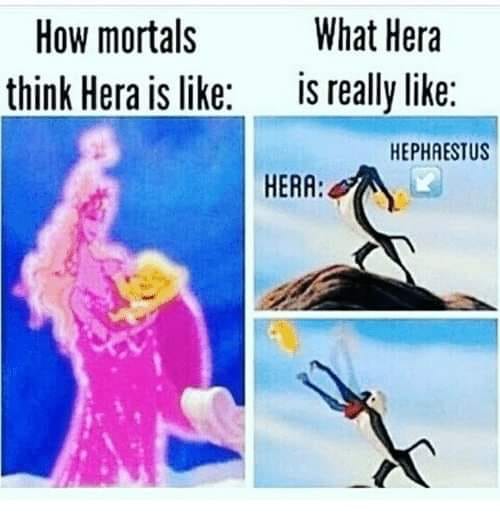Immortality
Immortality is the condition that separates mortals from the gods. But how exactly does it work, and is there any room for stretching the rules?
Here's what Greek mythology tells us:
The gods are immortal from birth, or earlier
Kronos was King of the Cosmos during the Second Age of Mankind. He was the world's undisputed ruler, but his reign couldn't last forever. Kronos was destined to be overthrown by one of his children, as Kronos had overthrown his own father. So Kronos decided to prolong his reign by eliminating his children as each was born. But the gods can't be killed. Not even newborn gods. Not even through all the power available to the strongest god in the world. Sure, newborn gods are already super capable. We can see from Hermes, walking, talking, and scheming Apollo out of his cattle on the same day he was born. But still, hatchling gods are the weakest and most vulnerable they'll ever be and yet, already immortal. Immortality may even be present for gods in utero. Semele was pregnant with Dionysus when she was atomized by the radiance of Zeus. Amazingly, her unborn child survived the blast. He was sewn into Zeus's thigh and brought to term, apparently without anyone noticing that the King of the Gods had a pregnant leg. Although, as we'll see, twice-born Dionysus is exceptional in a few ways.Gods can consume other gods without killing them
In the end, Kronos decided to swallow his children to keep them under his control. The children remained alive but harmless inside their father's gut, and grew to maturity in his belly. Eventually, through the trickery of Queen Rhea, the youngest son of Kronos was able to free his siblings by slicing open their father's gut. That god was Zeus. He and his siblings became the first in a new pantheon of gods. Which means that growing up inside another god didn't cause permanent harm to Poseidon, Hades, Hestia, Demeter, or Hera. Once Zeus was on the throne of Olympus, it was prophesied that any son born of Zeus and Metis would be the next to seize power. But instead of waiting for this would-be usurper to be born, as Kronos had done, Zeus preemptively swallowed the mother. Metis, the goddess of cunning intellect, settled into Zeus's brain. There, she gave birth to a child of the mind, Athena. The armed and armored goddess gave Zeus such a headache that he split his own head open to let her out. Luckily for Zeus, she was daughter rather than a son, and proved to be her father's loyal ally.Two or more immortals can merge together into one
You may wonder what happened to Metis after she was swallowed by Zeus, and after she gave birth to Athena. Although Athena was freed from the inside of Zeus's skull, Metis could never be allowed to escape, since she might then bear Zeus a dangerous son. Metis remained trapped inside Zeus's brain, providing the wisdom that became one of Zeus's attributes. This reflects actual practice, as ancient religions developed over hundreds or thousands of years. Local gods tended to merge together into standardized national versions, with echoes of the past surviving only as nicknames or epithets. The old gods didn't die off, as mortals understand death, but like Metis they survived as aspects of another better-known deity.The children of two immortals will also be immortal
You'd think there would have to be an exception to this rule. But then again, mortal children would probably have been such a scandalous disappointment to their immortal parents that we'd likely never hear about them! But consider Medusa. Her story has many different versions. In some, she was the child of two immortals, and a Gorgon from birth. In some, she was a human priestess who got herself turned into a monster by the wrath of Athena. In some versions she is turned to stone and/or decapitated by Perseus, but in some versions her head survives and cannot die. Could there be a version where Medusa is a mortal born to immortal parents, tries to get herself made into a goddess, instead gets transformed into an immortal petrification machine, and then lives on forever as a snake-haired shield adornment? That version of the story could certainly exist, now go off and write it!The children of a mortal and an immortal are born mortal...usually
Dionysus is one glaring exception to this rule, if you accept that he was conceived by the union of Zeus and Semele, the mortal daughter of mortal Cadmus (and his wife, Harmonia, who had two immortal parents). But Dionysus is a "twice-born god" who spent part of his pre-natal development sewn into Zeus's leg, so that Zeus could legitimately be considered to be both father and mother to him, as reckoned by an ancient people who were ignorant of genetics. Dionysus also had a convoluted history of worship and a connection to mysterious rites and arcane knowledge. So he's a complicated case in several ways.Mortals can be made immortal by the gods
...in theory. But in practice, this rarely works.- Demeter tried to grant immortality to Demophoon, and failed.
- Thetis tried to grant immortality to Achilles, and failed.
- Selene tried to grant immortality to Endymion, and he never woke up again.
- Eos tried to grant immortality to Tithonus, and ended up turning him into a bug!
Immortality can be temporary
Sometimes on the battlefield, warriors were granted a temporary immortality. For just a short while, they would have superhuman powers and could not be harmed by enemy weapons. In The Iliad, in multiple places, Homer describes these warriors as being "as the gods." Then the moment passes, the mortals become mortal again, and eventually they die.Immortals can still be hurt
Ouranous is castrated by Kronos. Prometheus suffers perpetual torture as punishment for granting fire to humans. Hephaestus is thrown off a mountain and is afterward permanently disabled. Ares and Aphrodite are both injured by mortals in the Trojan War. Tithonus shrivels away. Sometimes, the immortals probably envied mortals for their ability to end their suffering through death.Eternal life requires eternal maintenance
Immortality in Greek mythology does not mean immortal youth or immortal health. Hebe, a daughter of Zeus and Hera, was the goddess responsible for sustaining the health and vigor of her fellow immortals. As the Cupbearer of Olympus, she poured the nectar and ambrosia that was apparently required to provide the immortals with their strength and vitality. Hebe married Heracles after his apotheosis, securing the hero's ambrosia supply for all eternity. And with Hebe dedicated to Heracles, the job of Olympic Cupbearer was taken up by Ganymede.Although mortal, humans get an afterlife
The Greek heroes quested after kleos, a immortality of reputation that came with the eternal honor and glory of being included in stories and song. The mortals we read about are the ones who were successful in this quest. The Ancient Greeks also believed that upon death, a person's psyche separates from their body and journeys across the River Styx to the underworld domain of Hades. The greatest of heroes would spend their eternity in the nicest part of Hades's domain, the Islands of the Blessed. But that's another story and a whole other kind of existence.On This Page:
Elsewhere:
Join World Anvil to subscribe to updates.
Some are born with it

Kronos swallowed his children. They survived this.
Immortality doeesn't guarantee health

Hephaestus, thrown off Mount Olympus, never recovered.

Comments